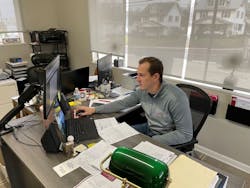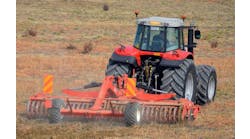Starting a business at any time is not easy. But try getting your start right before the beginning of a pandemic.
Philip Biscan took ownership of Van’s Tire Pros of Alliance in late 2018. Biscan worked at the single-location dealership — which is based in Alliance, Ohio — after high school as a tire technician.
He moved on to some different roles in the automotive repair business, but through the years kept in touch with owner Kirk Wineman.
One day, “out of the blue,” Wineman, who had been diagnosed with cancer, texted Biscan and asked if he wanted to buy the store.
At first, Biscan passed. But a few months later, he called back and told Wineman, “Let’s figure this out.”
Wineman passed away at age 55. Soon after, Biscan, then 31 years old, became the dealership’s new owner. At the time, the company had one employee.
“I ran it as a tire shop for six months. Then I added a mechanic and started doing small undercar stuff and alignments.”
In three years, the business has grown to include seven service bays, 11 employees and sales in excess of $1 million per year. And the struggle to keep and add staff has not been an issue for Biscan like it has for other tire dealers.
“I, fortunately, don’t really have a problem with that right now. With our reputation in the area, we actually have (people who) want to come work for us.”
The COVID-19 pandemic, which hit in March 2020, caused some initial concern, says Biscan.
“I didn’t know what was going on” at first, he admits. “When the state of Ohio shut down, I chose to shut down for two weeks — waiting to see what was going (to happen) and planning for the future.”
Ohio declared tire dealerships to be essential businesses.
With people’s need to maintain their cars and government stimulus money in their pockets, business picked up quickly.
“People who had neglected their cars finally had the money to put toward repairs, so I saw a pretty good influx of business then. And it has been a steady increase since.”
Biscan credits some of his sales growth to having added auto repair service, which now makes up 40% of his dealership’s total revenue.
He has made some other adjustments, as well.
“After COVID-19, we quit working Saturdays and went to Monday through Friday, eight to five. And that was to help with not stressing our employees out and having them work extra time to keep the crew we have.
“We also added four cars as a loaner program for the convenience of our customers. We have been getting good feedback on that.”
The dealership also carries more inventory and has diversified the number of tire brands that it carries — due in large part to supply chain challenges.
“We went from basically stocking $25,000 to stocking over $45,000 worth of inventory,” says Biscan.
In the short term, Biscan wants to “refocus and refine” what he does. The plan is to add other locations within the next five years or so.





